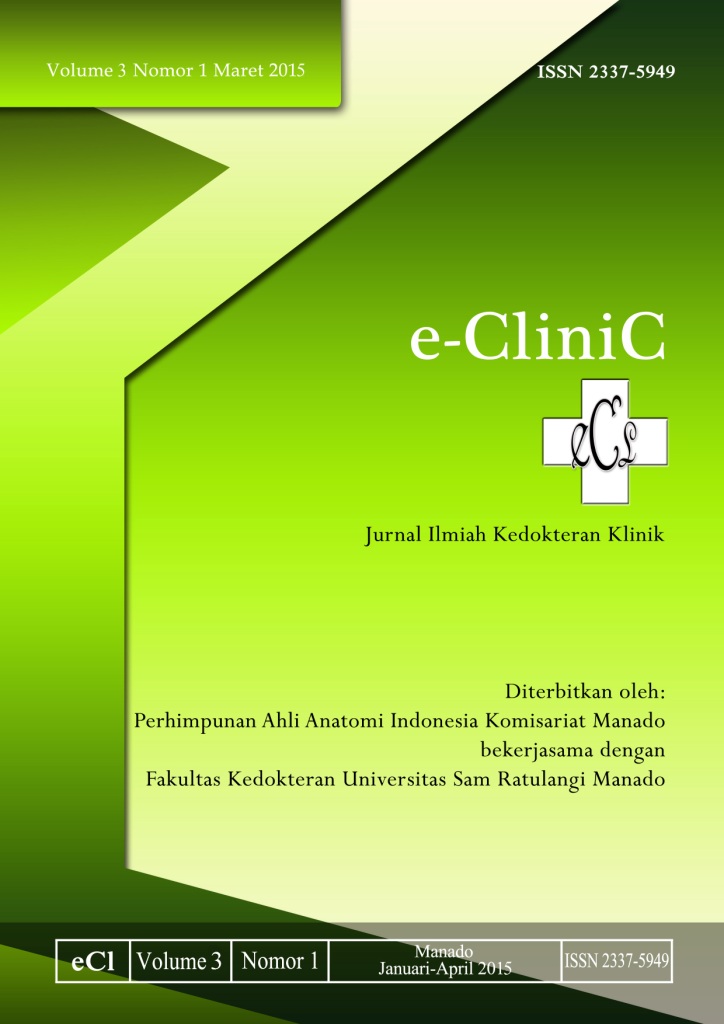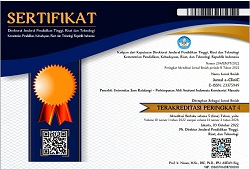HUBUNGAN FAKTOR GENETIK DENGAN TEKANAN DARAH PADA REMAJA
DOI:
https://doi.org/10.35790/ecl.v3i1.6602Abstract
Abstract: Essential hypertension is more commonly found in adolescent than in younger children and is strongly associated with genetic factor and obesity. Genes that play important role in hypertension mechanism are classified into genes that affect the natrium homeostasis in kidney, which include the I/D polymorphism ACE (Angiotensin Converting Enzyme) gene, and genes that affect steroid metabolism. Adolescents with hypertensive parents have higher risk of developing hypertension than those without familial history of hypertension. The aim of this research is to study the relationship between genetic factor (family history of hypertension) and blood pressure of adolescents. This was an analytic observational study with a cross sectional design. It was conducted in November- December 2014 at SMP Negeri 8 Malalayang. Samples were students with good nutritional status who are registered in that particular school and are given permission by their parents to participate in the study. There were 80 students who were involved in the study. Questionnaires were distributed to the students to know the existence of family history of hypertension especially in their parents and then the students’ blood pressure were measured. The data obtained is analyzed using Fisher’s Exact Test with SPSS program. The results showed that according to Fisher’s Exact Test, there was no significant relationship between genetic factor and blood pressure in adolescent. (p = 0.154 > 0.05). Conclusion: There was no relationship between genetic factor (hypertensive parents) and blood pressure in adolescent.
Keywords: genetic factor, blood pressure, hypertension, adolescent
Abstrak: Hipertensi esensial lebih sering ditemukan pada remaja dibandingkan dengan anak-anak dan dikaitkan erat dengan faktor genetik dan obesitas. Gen-gen yang berperan dalam mekanisme hipertensi dibagi menjadi gen yang mempengaruhi homeostasis natrium di ginjal, termasuk polimorfisme I/D gen ACE (Angiotensin Converting Enzyme) dan gen yang mempengaruhi metabolisme steroid. Remaja dengan orangtua hipertensif mempunyai resiko untuk mendapat hipertensi lebih tinggi dibandingkan anak dengan orangtuanya yang normotensif. Tujuan dari penelitian adalah untuk mengetahui hubungan faktor genetik (riwayat hipertensi dalam keluarga) dengan tekanan darah. Penelitian ini bersifat observasional analitik dengan rancangan potong lintang. Penelitian ini dilakukan pada bulan November – Desember 2014 di Sekolah Menengah Pertama Negeri 8 Malalayang. Sampel penelitian yaitu siswa yang memenuhi kriteria inklusi yaitu anak dengan status gizi baik yang tercatat di register sekolah serta mendapat izin dari orangtua untuk mengikuti penelitian. Subjek penelitian berjumlah 80 siswa. Kuesioner dibagikan untuk mengetahui riwayat hipertensi dalam keluarga terutama pada orang tua lalu tekanan darah anak diukur. Data yang diperoleh dianalisa menggunakan Fisher’s Exact Test dengan bantuan program SPSS. Hasil penelitian menunjukkan bahwa berdasarkan uji Fisher’s exact, tidak terdapat hubungan yang signifikan antara faktor genetik (riwayat hipertensi dalam keluarga) dengan tekanan darah pada remaja (nilai p = 0,154 > 0.05). Simpulan: Tidak terdapat hubungan antara faktor genetik (orang tua yang hipertensi) dengan tekanan darah pada remaja
Kata kunci: faktor genetik, tekanan darah, hipertensi, remaja
Downloads
Published
How to Cite
Issue
Section
License
COPYRIGHT
Authors who publish with this journal agree to the following terms:
Authors hold their copyright and grant this journal the privilege of first publication, with the work simultaneously licensed under a Creative Commons Attribution License that permits others to impart the work with an acknowledgment of the work's origin and initial publication by this journal.
Authors can enter into separate or additional contractual arrangements for the non-exclusive distribution of the journal's published version of the work (for example, post it to an institutional repository or publish it in a book), with an acknowledgment of its underlying publication in this journal.
Authors are permitted and encouraged to post their work online (for example, in institutional repositories or on their website) as it can lead to productive exchanges, as well as earlier and greater citation of the published work (See The Effect of Open Access).







